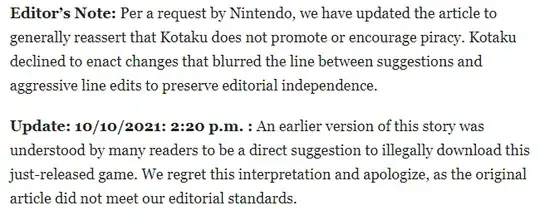This question came to mind while discussing in the Arqade.SE chat rom about some recent scandals related to an online gaming news site.
Back in October 2021 said media posted an article about a recent videogame release, going into details about how to emulate it and how emulation provided a better experience than playing the game on the actual console due to increased resolution and other similar benefits.
The article is fully visible on the Way Back Machine here. Following are the main passages.
So...
- the first passage jokes about the article being something that could cause them troubles with a "lawyer"
- the second passage claims that "all you need is a PCand an emulator". But that is not true: you need also a copy of the game and a modded Switch (since making the "ROM backup" yourself is the only legal way to get a ROM afaik, and even that probably isn't true in every country). The only way to just need an emulator is if you download the game from a pirate site.
- the final paragraph takes the prize with the "Thank God for pirates" line
Basically the whole article looks like it just advocating for piracy and suggesting that customers should commit a crime to "pay less".
The article caused a lot of controversy, to the point that it was edited just a day later.
The article was edited again and again, and currently it ends with these notices.
I guess that thanks to Nintendo own involvement things went just "too fast" for actual law enforcers to get on the case, but after the same site was recently involved in another scandal about posting info on a yet-to-be released title that was leaked and thus available illegally on the web I had some exchanges with other users on SE that lead to this question.
Would the original version of the Metroid article be enough to be consider "Incitement to piracy" and thus be an explicit violation of law in any country? And even if this specific example would not be enough to be acted on, would an hypothetical article that makes the "suggestion" even more explicit violate the laws?
Personally I don't see the original version of the article to be defensible in any way due to the considerations I made before, in my opinion there is no way to interpret the article as anything else than an incitement to pirate the game. But since I am not a lawyer nor a student in laws I would like for a more based view from users with more experience in the area.
Small clarification: while I have mentioned the revised article for sake of context, please ignore it when answering. My actual question is if the original version without any revision would constitute "Incitement" and in case it would not if a made-up even more direct article could.




